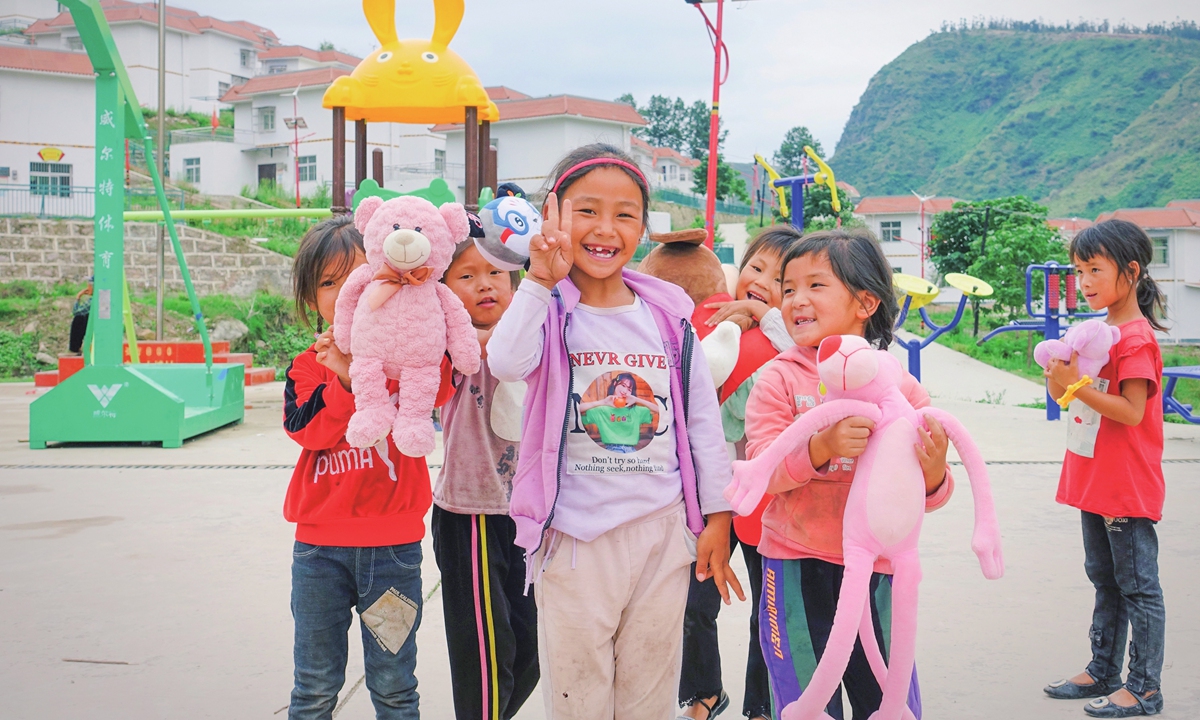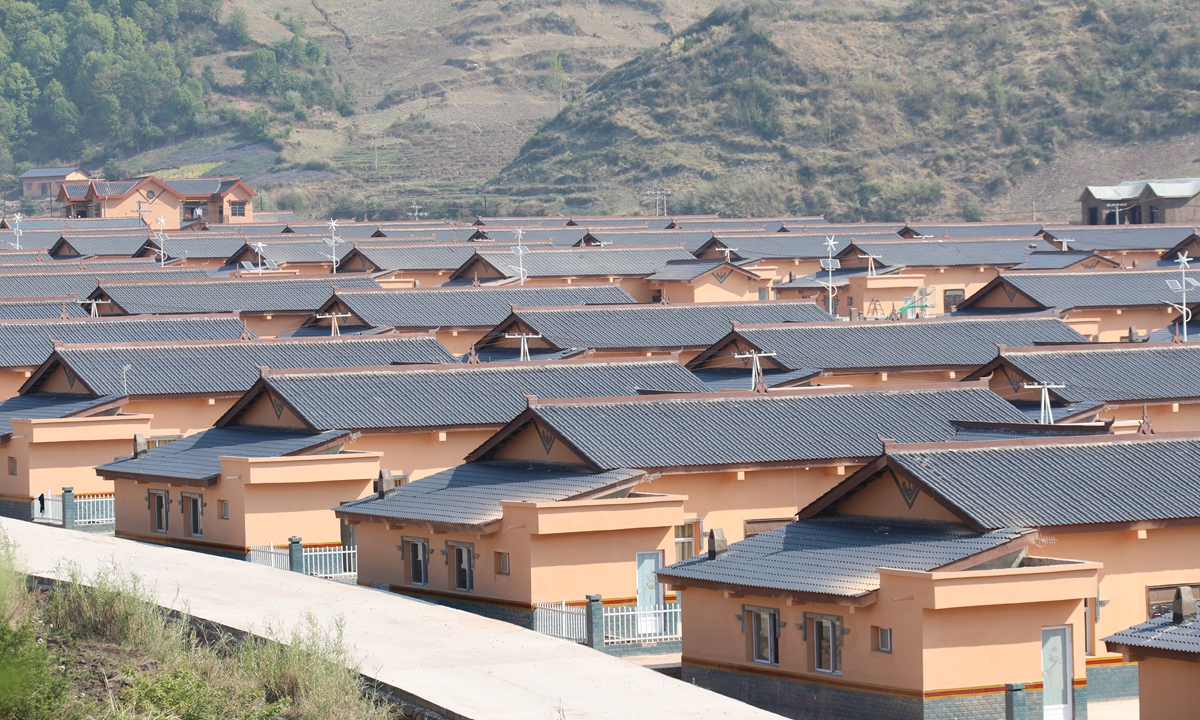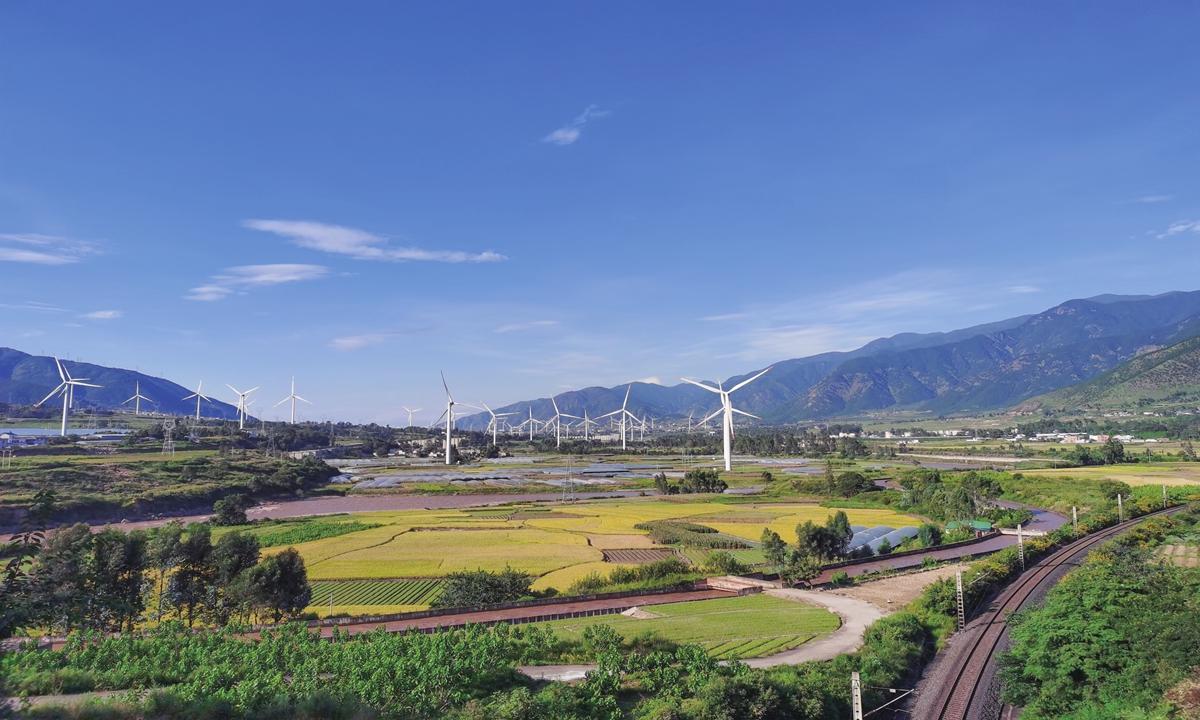
Female students take their school-issued toys to the playground at recess in Huobo village in Puge county, Liangshan, on June 30. Photo: Lin Xiaoyi/GT
In late June, Baihetan Hydropower Station, one of China's most important mega-projects, began operations joining the country's power grid, contributing to the country's productivity and prosperity. Set deep in the Daliang Mountains in Southwest China, it surely benefits the local mountain residents more than it does to the rest of country.
Last year, Wen Quanwan and hundreds of his fellow villagers became the first to be relocated from dilapidated housing in the project's reservoir area to newly constructed bright and spacious cottages, as part of the Baihetan Hydropower Station project.
Through on-site interviews, the Global Times found that the project has proven to be an opportunity for locals to relocate from the mountainous terrain and shake off poverty to embark on a hopeful new life, in step with the whole country.
"I am a witness to this history, it is the CPC that has overcome all these difficulties to give us the opportunity to get such new, happy life in the deep mountains," Wen said.
Liangshan Yi Autonomous Prefecture in Southwest China's Sichuan Province was once one of the poorest regions in China. It is gratifying that an increasing number of social forces are paying attention to this region and investing more resources to promote its development.
Local business at relocation community 'grow exponentially'At the Baihetan Hydropower Station resettlement site in Dechang county, Liangshan, the couplets posted on each house show the joy of the residents after relocation and their expectations for the future.
"Many people moved into new houses during the Spring Festival this year with joyous drumming. Because local authorities and the China Three Gorges Corp (CTG), the main investors and contractors of the Baihetan Hydropower Station, have provided sound relocation and follow-up plans for those relocated, we felt at ease with the new environment," Wen said.
Wen noted that in 2019, he was elected as the homeowner representative of 49 families to be relocated in the village. From the selection of the resettlement site to the design and construction of the houses, the soon-to-be relocated had the opportunity to participate in the decision-making and supervision. Through full consultation, the migrants have been able to buy high-quality homes at low prices and received substantial compensation.
"What touched us was that the local immigration office and CTG did not pull away after the relocation, but actively put in place a series of employment and industrial assistance programs to help us better integrate into our new environment," Wen said. Wen said that many resettled residents used to grow crops such as navel oranges along the Jinsha River. After the relocation, the government gave each person an extra mu of fertile farmland and organized for local agricultural experts to teach cultivation skills. "Now we are self-sufficient without having to go to the market for food, and by next year, the corn we planted will be ready to be sold."
Although he has not been to Dechang for long, Wen has already learned so much about the area's excellent natural condition leading his neighbors to open a holiday homestay, which is growing exponentially.

A view of the new houses in Jiajiagou village built by China Three Gorges Corp Photo: Courtesy of China Three Gorges Corp
"Previously, there was only one minibus into the county every day in my hometown, and it would take more than half a day to travel 120 kilometers. After moving, we only spend two yuan, and no more than 10 minutes to go to the center of the city. In the past, young people in the village all wanted to work in first-tier cities in the east, but now, many of them have the idea of returning home to find jobs or start their own businesses," he said.
According to Zhou Cheng, secretary of the CTG's Migration Office, the Baihetan Dam relocation project took 10 years to complete and involved six counties in Yunnan and Sichuan provinces, all of which used to be poor counties, with over 100,000 people relocated.
CTG has built a total of 47 fully equipped resettlement sites, with a floor area of about 6.13 million square meters, equivalent to 100 standard football fields. In the second half of 2020 alone, over 60,000 people were employed for housing, transportation, water, and hydropower construction projects for the resettled, fully boosting local employment.
"The total investment of Baihetan Hydropower Station is about 220 billion yuan ($34.07 billion), among which resettlement investment has exceeded 63 billion yuan, as relocation is a major factor in people's livelihood in the project. We must shoulder our responsibility to let the benefits brought by Baihetan Hydropower Station enjoyed by the whole Daliang Mountains," Zhou told the Global Times.
'Vibrant and positive atmosphere' of starting a new lifeShamaziga, a young Yi man from Puge county, Liangshan, is one of a large number of people who have returned to their hometown to start businesses. This year, he submitted a Party membership application to the Party branch in Jiajiagou, where his new home is located.
"I used to live with my parents in an old house deep in the mountains. Next to the house was a pigsty and the door was always stained with pig manure. If there were heavy rains, our whole family would be afraid to sleep for fear that the house would be washed away," he told the Global Times. "Since I was a child, I have always been determined to leave the mountains and never come back."
Now, at a cost of only 10,000 yuan, Shamaziga has moved into the new CTG-aided village, where small buildings with painted yellow walls and gray tiles in a rich, authentically Yi style are neatly arranged. Looking out from his courtyard, doctors in the village health center give free medical check-ups to the villagers; in the fields at the entrance of the village, many villagers work while humming folk songs.
For thousands of years, the Yi people have lived in near isolation because of the high mountains and valleys that separate them from the rest of the world. At one time, 11 of the 17 counties in Liangshan Prefecture were in deep poverty, with a poor population of nearly 1 million.
Before 2019, Shamaziga was working as a programmer in East China's Jiangsu Province, when he saw the tremendous changes in his hometown during the Yi's New Year holiday. He decided to go back to start wholesaling and retailing goods in various township markets.
"Our business is just starting. We don't earn much money but it's enough for our family to lead a stable life. There is no fierce competition, but the whole village has a vibrant and positive atmosphere of starting a new life," he said.
Shamaziga noted that every big leap of the Yi people in Liangshan Prefecture could not have been achieved without the CPC. "It was the CPC that established the New China and brought Daliang Mountains directly from a slavery to a socialist society. By 2020, we were already ushering in greater development and opportunities after abandoning outmoded practices and continued on our journey to poverty alleviation."
Puge county was one of the last deeply poverty-stricken counties in China. By November 2020, all 68,000 poverty-stricken people in 103 villages in the county had their poverty alleviated. Over the past few years, the annual per capita income of the impoverished people in Puge has increased from 2,600 to 8,500 yuan, more than 130,000 people who lived in poverty have been relocated in the county as part of the poverty reduction campaign.

Wind turbines at Dechang county, Liangshan Yi Autonomous Prefecture in Southwest China's Sichuan Province Photo: IC
According to the staff of Jiajiagou village, all towns in Puge have formed support teams to continuously monitor the low-income groups, taking targeted measures such as offering public service jobs, providing labor skills training, and industrial assistance to ensure at least one person in each farming household has a relatively stable income.
In Huobo village, about 60 kilometers away from Jiajagou village, which was also built with CTG's assistance, 39-year-old Gipmuziza never expected to become a tomato growing specialist.
"In the past, women in the mountains had no gainful employment apart from their household duties, but now we have moved to a new house, the village cooperative has since introduced vegetable greenhouses. In addition to the year-end bonus, I weed and fertilize the nursery every day and can earn an extra 3,000 yuan a month," she said.
Kids in mountain village school 'talk about internet and 5G technology'The development plan in Liangshan Prefecture has also been upgraded from the most basic level of guaranteeing access to education for children to higher requirements and goals.
Gao Wensen, principal at the Xixiang Middle School of Xichang, will never forget the excited looks of the students when they met their new teachers and discovered their classrooms were equipped with multimedia equipment a year ago.
Gao noted that with the help of the local education bureau and many enterprises, better equipment and more qualified teachers have come to Daliang Mountains.
"Children who once bit the bullet to go to school and didn't even know what a textbook or desk was are now able to talk to strangers about topics like the internet and 5G technology," he told the Global Times.
At one time, the interplay of economic, cultural, and spiritual poverty was a major cause of strained circumstances among the Yi people, Rong Jinglong, secretary-general of Liangshan Education Foundation, told the Global Times. "Over the years, through a series of educational efforts, Liangshan Prefecture gradually dealt with the "root cause" of intergenerational poverty transmission. By the end of 2020, the net enrolment rate in primary and secondary schools in Liangshan had exceeded 98 percent," he added.
Last year, Zhang Meng, a university graduate from Northeast China's Jilin Province, was selected to become a Chinese teacher at Xixiang Middle School through the CTG's "Candlelight Initiative."
"Compared to the developed areas in eastern China, influenced by the old idea of 'studying is useless,' many children here did not develop good study and living habits from an early age and could not adapt to school life, and were even truanted or dropped out of school altogether," Zhang said.
Zhang pointed out that the school is now focusing on strengthening the home-school link and focusing on psychological guidance and emotional education for the students.
"With dreams, through hard work, we must be able to assume more responsibilities for our families and country." Dishidong, a junior student from the "Three Gorges Inspirational Class" at Liangshan Ethnicity Middle School, wrote on a bilingual questionnaire distributed by the school in both Chinese and Yi.

Baihetan Hydropower Station Photo: IC
If he hadn't been admitted to the Inspirational Class, Dishidong would have studied in the rolling hills, spending the summer holiday cutting buckwheat, harvesting potatoes, and herding sheep, just as he did in previous years. Now, Dishidong and his classmates are excitedly discussing the location of the summer camp after the final exams. They want to visit the Baihetan Hydropower Station, which has just been put into operation.
The dozens of "Three Gorges Inspirational Class" programs in various middle schools in Liangshan are mainly for those resettled from the Baihetan and Xiluodu dam areas, and for ethnic minority and Han students of exemplary academic potential.
Rong noted that the Inspirational Class is an upgraded version of the many educational programs they have implemented in recent years.
"The number of such 'highly configured' classes is increasing year on year. As China's comprehensive national power increases, our support programs have changed from the previous years' 'orphan classes' and 'girls' classes' to classes that emphasize children's overall development," Rong said.
"Large amounts of funding have shifted from ensuring children were well fed and clothed to having more opportunities for better development, and this effort has gradually covered a larger child demographic," he added.







